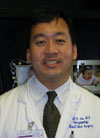Treatment promising for head, neck cancer
by Heather MurphyPublic Relations
In the heart of tobacco country, South Carolina wins the award for some of the highest rates of oral cancer in the country.
As a result of tobacco’s unhealthy side effects, some think legislators should levy a tobacco tax or make public smoking illegal.
But while people speculate what should be done about tobacco, MUSC researchers and physicians continue to look for ways to treat the cancers tobacco can cause.
James Norris, Ph.D., and the colleagues in his lab have pioneered an genetically-engineered adenovirus to destroy cancer cells.
After reporting a high success rate when tested with prostate cancer cells, MUSC researchers expanded the adenovirus tests to head and neck cancer cells.
 Dr.
John Joe
Dr.
John Joe
“It was a natural next step to look at the adenovirus as a head and neck cancer treatment,” said John Joe, M.D., new to the Otolaryngology/Head and Neck Surgery Department. “Cancers of the mouth and throat, by virtue of their location, may be more accessible to delivery mechanisms for gene therapy such as viral injection, compared to other tumors arising elsewhere in the body.”
Patients with head or neck cancers often present at advanced stages of a particular cancer, increasing chances for reoccurrence even if the cancer is treatable.
“Head and neck cancers are particularly devastating because they are very apparent,” Joe said. “Patients experience facial changes and difficulty speaking, swallowing or breathing. They have to deal with major aesthetic and functional problems at the same time.”
Joe, who attended medical school at Vanderbilt in Nashville, Tenn., and completed his residency training at Yale, came to MUSC after completing a fellowship in head and neck oncology surgery at Memorial Sloan-Kettering Cancer Center based on the university’s multidisciplinary focus on patient care and research.
He lives with his wife, Cindy, and 1-year-old daughter Molly in Mount Pleasant.
“Under the direction and vision of Dr. Paul Lambert, (M.D.), the Otolaryngology Department here is unique when compared with other academic medical centers,” Joe said. “The department is proactive in assembling a variety of attending physicians with different areas of interest and expertise, all of whom are committed to teaching, clinical care, and research. I acknowledge Terry Day, M.D., for establishing the multidisciplinary Head and Neck Tumor program through Hollings Cancer Center at MUSC. The comprehensive management of head and neck cancers here is unique and truly a team effort.”
Joe, no stranger to working with viruses, performed research during his fellowship at Memorial Sloan-Kettering Cancer Center involving the herpes virus and how it acts against cancer cells.
Like most viruses, the adenovirus used in Norris’ lab proves useful in battling head and neck cancer cells by invading them and causing them to burst.
But unlike other viruses, the genetically-altered adenovirus doesn’t propagate; instead the bystander effect occurs.
This means that when one cancer cell dies, the other cancer cells around it die too, without damaging healthy tissue.
As one would suspect, the adenovirus treatment stands to take the cancer treatment world by storm.
“Advanced stage cancers can be very difficult to treat and generally have a low recovery rate,” Joe said. “They may not be amenable to other treatments like surgery, radiation or chemotherapy. Another tool would definitely be welcome in fighting head, neck and all other types of cancer.”
The next step involves the establishment of funding for clinical trials to prove the adenovirus works on head and neck cancer cells as well as prostate cancer cells.
From there, so the saying goes, the sky’s the limit.
Catalyst Online is published weekly, updated as
needed and improved from time to time by the MUSC Office of Public Relations
for the faculty, employees and students of the Medical University of South
Carolina. Catalyst Online editor, Kim Draughn, can be reached at 792-4107
or by email, catalyst@musc.edu. Editorial copy can be submitted to Catalyst
Online and to The Catalyst in print by fax, 792-6723, or by email to petersnd@musc.edu
or catalyst@musc.edu. To place an ad in The Catalyst hardcopy, call Community
Press at 849-1778.